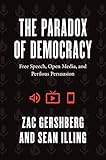The paradox of democracy : free speech, open media, and perilous persuasion / Zac Gershberg and Sean D. Illing
Language: eng Publication details: New York : University of Chicago Press, 2022.Description: 329 pages ; 24 cmISBN:- 9780226681702
- 022668170X
- P 95.8 G381p 2022
| Item type | Current library | Home library | Collection | Shelving location | Call number | Copy number | Status | Date due | Barcode |
|---|---|---|---|---|---|---|---|---|---|
 Libro
Libro
|
Biblioteca Juan Bosch | Biblioteca Juan Bosch | Humanidades | Humanidades (4to. Piso) | P 95.8 G381p 2022 (Browse shelf(Opens below)) | 1 | Available | 00000163433 |
Browsing Biblioteca Juan Bosch shelves, Shelving location: Humanidades (4to. Piso), Collection: Humanidades Close shelf browser (Hides shelf browser)

|

|

|

|

|

|

|
||
| P 95.8 G216c 1992 Comunicación de masas y pensamiento político / | P 95.8 G216c 2005 Comunicación política y campañas electorales : estrategias en elecciones presidenciales / | P 95.8 G241r 2011 Rusia tras la Perestroika : propaganda política, cultura y memorias del cambio / | P 95.8 G381p 2022 The paradox of democracy : free speech, open media, and perilous persuasion / | P 95.8 G383c 2008 La communication politique / | P 95.8 G383c 2016 La communication politique / | P 95.8 G562 2002 Global media policy in the new millennium / |
Introduction Chapter 1: The Bias and the Disruption Chapter 2: Mere Rhetoric: From Free Speech to Bread and Circuses Chapter 3: The News-Print Revolution Chapter 4: The Rise of the Public(s): From a Fuller World to Morse's Macrocosm Chapter 5: This Is Fascism Chapter 6: Playing Checkers: An Uneasy Triumph for Liberal Democracy Chapter 7: The Death of Liberal Democracy: Have We Got Fake(d) News for You Chapter 8: Democracy, If We Can Keep It Epilogue Notes Index
At the heart of democracy lies a contradiction that cannot be resolved, one that has affected free societies since their advent: Though freedom of speech and media has always been a necessary condition of democracy, that very freedom is also its greatest threat. When new forms of communication arrive, they often bolster the practices of democratic politics. But the more accessible the media of a society, the more susceptible that society is to demagoguery, distraction, and spectacle. Tracing the history of media disruption and the various responses to it over time, Zac Gershberg and Sean Illing reveal how these changes have challenged democracy--often with unsettling effects. The Paradox of Democracy captures the deep connection between communication and political culture, from the ancient art of rhetoric and the revolutionary role of newspapers to liberal broadcast media and the toxic misinformation of the digital public sphere. With clear-eyed analysis, Gershberg and Illing show that our contemporary debates over media, populism, and cancel culture are not too different from the democratic cultural experiences of the past. As we grapple with a fast-changing, hyper-digital world, they prove democracy is always perched precipitously on a razor’s edge, now as ever before.


There are no comments on this title.